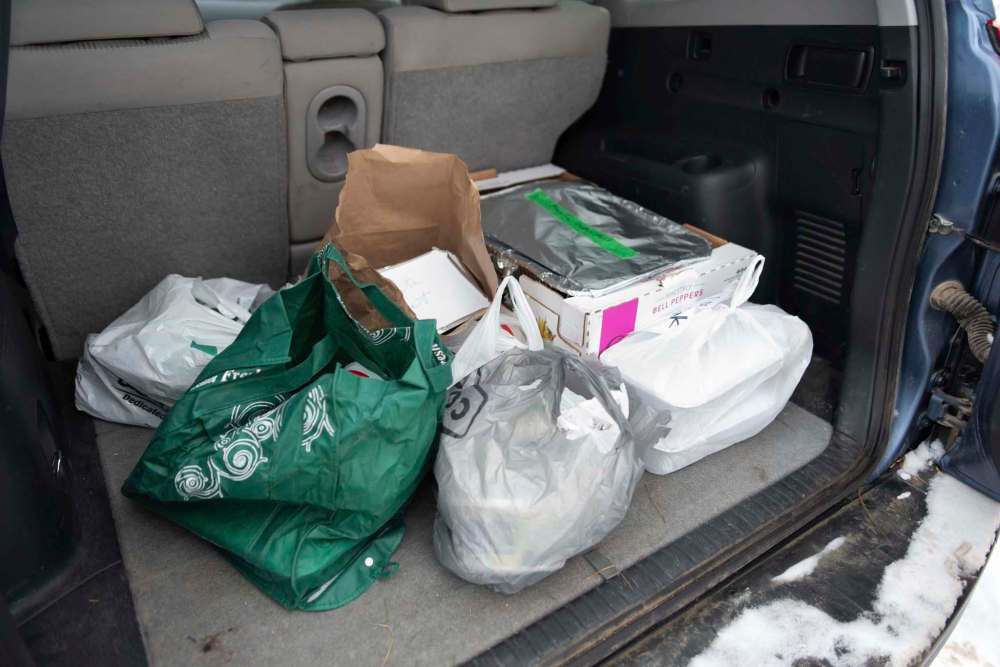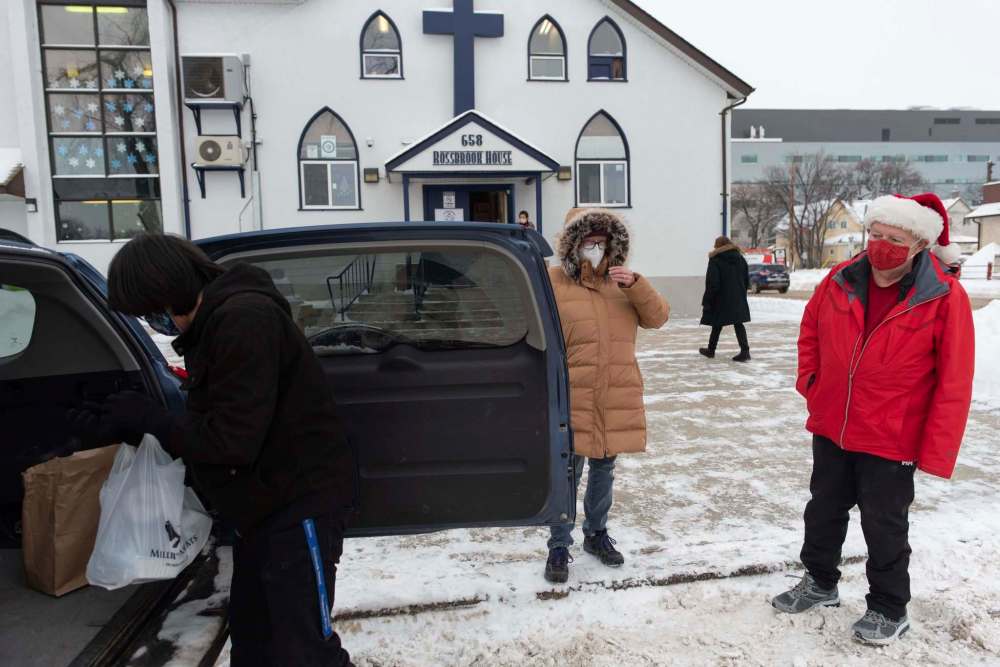Across Winnipeg, the journey of a Christmas turkey
Advertisement
Read this article for free:
or
Already have an account? Log in here »
To continue reading, please subscribe:
Monthly Digital Subscription
$1 per week for 24 weeks*
- Enjoy unlimited reading on winnipegfreepress.com
- Read the E-Edition, our digital replica newspaper
- Access News Break, our award-winning app
- Play interactive puzzles
*Billed as $4.00 plus GST every four weeks. After 24 weeks, price increases to the regular rate of $19.00 plus GST every four weeks. Offer available to new and qualified returning subscribers only. Cancel any time.
Monthly Digital Subscription
$4.75/week*
- Enjoy unlimited reading on winnipegfreepress.com
- Read the E-Edition, our digital replica newspaper
- Access News Break, our award-winning app
- Play interactive puzzles
*Billed as $19 plus GST every four weeks. Cancel any time.
To continue reading, please subscribe:
Add Free Press access to your Brandon Sun subscription for only an additional
$1 for the first 4 weeks*
*Your next subscription payment will increase by $1.00 and you will be charged $16.99 plus GST for four weeks. After four weeks, your payment will increase to $23.99 plus GST every four weeks.
Read unlimited articles for free today:
or
Already have an account? Log in here »
Hey there, time traveller!
This article was published 26/12/2020 (1768 days ago), so information in it may no longer be current.
The common turkey is a flightless bird, but it isn’t journeyless.
It starts at a farm or a plant, it goes to the slaughter, and then it goes to the store.
Christmas is a popular time for this one-way trip, which then takes a pitstop in the digestive tract: last year, 2.7 million whole turkeys were bought in Canada at yuletide, 42 per cent of all those sold in this country in 2019.
Talking Turkey
The holidays are an important time for the turkey industry: over the past several years, nearly half of all whole turkeys sold in Canada are sold over the Christmas season.
The holidays are an important time for the turkey industry: over the past several years, nearly half of all whole turkeys sold in Canada are sold over the Christmas season.
The pandemic has had an impact on overall turkey sales in 2020, according to the Turkey Farmers of Canada, with a negative impact on foodservice and deli counter sales in particular: in May, a 7 per cent decrease on production was implemented to account for the changes in consumption, a communications rep for the organization said.
However, there’s been increased sales of retail turkeys throughout the year, with Easter and Thanksgiving sales of whole turkeys actually surpassing totals from last year. Yet it’s still not likely enough to counter the decrease in production.
The turkey’s journey starts at one of 520 registered turkey farms across Canada in eight provinces, which operate under a national marketing system to match consumer demand, Maegan MacKimmie of the Turkey Farms association said.
The average cost of a whole fresh turkey last year was $5.02/kg, with whole frozen turkeys selling for $3.43/kg, according to Agriculture and Agrifoods Canada.
Some people with large appetites buy turkeys for themselves. Most buy them to prepare for their families and friends at a holiday feast. However, other turkeys are bought to be shared and donated to charities and non-profits across the country, a noble end for a select group of dinde.
But the turkey is a flightless bird, especially when roasted, and flightless, roasted birds need pilots. On the Monday before Christmas, Allan and Marion McKay, and Dan Wiwchar, were in the cockpit, swooping across Winnipeg to pick up 16 gobblers and deliver them to their final destination: Rossbrook House.
“I want to clarify,” says Allan. “These turkeys are cooked, frozen and sliced.”
For the last 41 years, the trio’s church, Westworth United, has been making the same delivery to Rossbrook, a central drop-in centre founded in the late ‘70s that provides programming, community, and meals for hundreds of youth every year. Nearly as long as Rossbrook’s had its doors open, Westworth United has been bringing the Christmas poultry: the number of birds is likely higher than 700.
The annual process starts in November, when a parishioner puts out a call for turkeys in the church news bulletin, although that’s more a formality: most everyone knows when it’s time to head to the store and start their ovens.
Then the week before Christmas, people like the McKays and Wiwchar — and before them the Habermans, the Challises, the Erskines and more — fan out to collect. This year, they selected as their designated pick-up date Dec. 21, which so happened to be the day after 12 centimetres of snow fell across the city, turning the roads slick.

“Between us, there are 16 turkeys to pick up today,” says Allan, who with Marion will pick up eight. “We rendezvous at Rossbrook House tomorrow morning at 10 o’clock in the morning.”
On Monday, the McKays climbed into their blue Toyota RAV4 to crisscross the city. They started in Richmond West, then headed to Linden Woods, then the downtown, then out by Concordia Hospital for the last turkey of the day. Wiwchar took the River Heights and Charleswood area.
At 11 a.m., Wiwchar arrived at Nancy Doern-White’s Charleswood house, where the tradition of cooking a Christmas turkey for Rossbrook started with her 95-year-old mother, Jean, and before that, with her great aunt Ruth, who volunteered with Rossbrook.
At least thirty years ago, Jean began signing up to cook. But as she got older, it became tougher for her to do, so Nancy took over, although Jean still plays an important role.
“I buy the turkey, my mom still wants to pay for it, so she does, then I cook it, my husband carves it because he’s so good with a carving knife, and I make the gravy,” says Doern-White, a retired dietician, who bought the turkey at Superstore at Thanksgiving time.
“I wanted to make sure I could buy one, because some years, they’re hard to find,” she says. This year, that rings especially true: a study by Dalhousie University found COVID-19 has led to a surge in food insecurity, with one in three children going hungry now versus one in four prior to the pandemic.
Another reason, says Ruth Wiwchar, who’s married to Dan, is that there’s been a shortage of big birds. “We like a 25-pounder,” she says, “but it was hard to find a big turkey this year, kiddo.”
But she found one, and cooked it Sunday in her great-great-grandmother’s roasting pan. “I know, I waited until the last minute,” she laughs.
Wiwchar was quick in his mission: he started at 10 and was home by noon, having picked up seven birds with an eighth waiting at home, Ruth says. But the McKays’ schedule was more spread out, so by the time Wiwchar was home, the RAV4 was still on the road.
At 2:30 p.m., while a food delivery driver rang the doorbell at an apartment block on Vaughan Street, the McKays pulled up in front of the apartment of Rev. Mac and Bev Watts for a different kind of gastronomic transaction.
With snow piled, the Watts emerged, Bev in a bluish, violet jacket with a feathered collar and Mac, pushing his black walker with a large brown paper bag sitting atop it. Both had masks squeezed tightly over their mouths and noses and waved as the McKays drove off.
For about 20 years, the Watts have contributed a turkey for the cause. “There’s no doubt about who cooks the turkey, though,” says Mac, a retired United Church minister and the former dean of theology at the University of Winnipeg who just turned 92. “Bev does it all.”
This year, at 90, but don’t make a big deal of it, she drove to Sobeys to pick up a bird. The key is to watch it well to make sure it doesn’t dry out, she says, wrapping it in brown paper with some butter does the trick. She also uses a meat thermometer to make sure it’s cooked through. It’s really not so difficult, she says.
“We’re taking the easy way out,” says Mac. “The people at Rossbrook house are on the frontline all year, working to help those who are disadvantaged, and at Christmas in particular, they want people to have a chance to enjoy a decent holiday.”
After leaving the Watts, Allan and Marion drove to East Kildonan to the home of Sharon Stanley for their last pick-up of the day. Compared to the veterans, Stanley is a novice, having just started cooking turkeys for Rossbrook last Christmas. She’s also a vegetarian.
“It’s the only time I cook a turkey, I can say that,” she says.
Monday afternoon, with a forecast of another snowfall on the horizon, Wiwchar called McKay to tell him he’d be missing the rendezvous: he wanted to beat the weather to deliver the goods.
So Tuesday at 10 o’clock when the McKays pulled up at the corner of Sherbrook and Ross, they alone popped their trunk as staff poured out to carry bag after bag of turkey across the slippery sidewalk and into the centre.
Over the next week, the meat and gravy will be kept in the downstairs kitchen, doled out to youth in the form of a hot-turkey sandwich, a simple, 41-year long tradition that not even a pandemic could stop.
“Oh those are just going to get gobbled up,” shouts Rossbrook employee Denise Michaud before the McKays drive away.
Journey complete: The turkeys had landed.
ben.waldman@freepress.mb.ca


Ben Waldman covers a little bit of everything for the Free Press.
Our newsroom depends on a growing audience of readers to power our journalism. If you are not a paid reader, please consider becoming a subscriber.
Our newsroom depends on its audience of readers to power our journalism. Thank you for your support.


